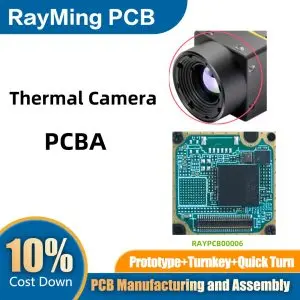Overview
Rogers prepreg materials represent the industry-leading solution for high-frequency multilayer PCB construction, offering superior electrical performance and reliability for demanding RF, microwave, and millimeter-wave applications. These advanced bonding materials enable the creation of sophisticated multilayer PCB designs while maintaining exceptional signal integrity and thermal stability.
Key Product Series
RO4400™ Series Prepreg Materials
Primary Materials:
- RO4450B™ – Standard high-frequency prepreg with excellent electrical properties
- RO4450F™ – Enhanced flow properties for improved processing and cavity filling
- RO4450T™ – Fiberglass-reinforced prepreg offering multiple thickness options
- RO4460G2™ – High dielectric constant (6.15 Dk) prepreg for specialized applications
Specialized Bonding Films
Thermoplastic Options:
- Rogers 3001 – Unreinforced thermoplastic film (Dk=2.3, Df=0.003)
- CuClad 6700 – CTFE thermoplastic copolymer (Dk=2.3, Df=0.003)
- Rogers 2929 – Thermoset bonding sheet (Dk=2.9, Df=0.003)
Advanced Solutions:
- CLTE-P – Semi-cured adhesive for PTFE multilayer applications
- COOLSPAN TECA – Thermally conductive epoxy adhesive with silver filler
Technical Specifications
Electrical Properties
- Dielectric Constant (Dk): 3.23-6.15 @ 10 GHz (±0.05 tolerance)
- Dissipation Factor (Df): 0.0039-0.004 @ 10 GHz
- Frequency Range: DC to 77+ GHz
- Volume Resistivity: 2.9×10⁹ to 8.93×10⁸ Mohm·cm
Thermal Characteristics
- Glass Transition Temperature (Tg): ≥280°C (post-cure)
- Thermal Conductivity: 0.50-0.65 W/m/°K
- CTE (X/Y): 17-21 ppm/°C
- CTE (Z-axis): 50-57 ppm/°C
- Processing Temperature: 175°C (350°F)
Mechanical Properties
- Water Absorption: 0.09-0.11% (D48/50%)
- Density: 1.83 gm/cm³
- Flammability Rating: UL94 V-0
- Lead-Free Compatible: Yes
Key Benefits
Superior Electrical Performance
- Ultra-low loss characteristics for minimal signal attenuation
- Excellent dielectric stability across temperature and frequency ranges
- Consistent impedance control for high-speed digital and RF applications
- Low passive intermodulation (PIM) for base station antennas
Manufacturing Advantages
- FR-4 Compatible Processing – Standard lamination equipment and temperatures
- Excellent Flow Control – RO4450F offers improved lateral flow for complex designs
- Multiple Lamination Capability – High Tg enables sequential lamination cycles
- Cost-Effective Hybrid Construction – Combine with FR-4 cores to optimize performance/cost ratio
Design Flexibility
- Multilayer Compatibility – Seamlessly integrates with RO4000 series cores
- Thickness Variety – Multiple prepreg thicknesses available
- Hybrid Stackups – Enables Rogers/FR-4 mixed constructions
- Via Compatibility – Supports microvias, blind vias, and through-holes
Applications
Aerospace & Defense
- Military radar systems
- Satellite communication equipment
- Avionics systems requiring extreme reliability
- Phased array antennas
Automotive
- 77 GHz automotive radar sensors
- Advanced Driver Assistance Systems (ADAS)
- Vehicle-to-everything (V2X) communication
- Electric vehicle power management
Telecommunications
- 5G infrastructure and mmWave applications
- Base station power amplifiers
- Microwave point-to-point links
- Cellular antenna systems
Commercial RF
- IoT and wireless sensor networks
- RFID systems
- GPS and navigation equipment
- High-speed digital interconnects
Construction Guidelines
Hybrid Stackup Design
- Position Rogers cores on critical signal layers
- Use FR-4 prepreg for non-critical layers to reduce cost
- Implement “cap construction” for optimal performance
- Consider thermal management requirements
Processing Recommendations
- Standard FR-4 lamination procedures apply
- Press at 175°C with appropriate pressure cycles
- Compatible with standard drilling and plating processes
- Supports conventional surface finishes (HASL, ENIG, OSP)
Material Storage
- Store in controlled environment (temperature/humidity)
- Metalized materials can be stored under standard conditions
- Follow Rogers guidelines for shelf life and handling
Quality & Compliance
- RoHS Compliant – Environmentally friendly formulations
- UL94 V-0 Rated – Excellent flame retardancy
- CAF Resistant – Superior ion migration resistance
- Lead-Free Compatible – Suitable for modern assembly processes
Why Choose Rogers Prepreg Materials?
Rogers prepreg materials deliver unmatched performance for high-frequency multilayer PCB applications where signal integrity, thermal stability, and manufacturing reliability are critical. With over 60 years of materials science expertise, Rogers continues to set the industry standard for advanced PCB substrates, enabling next-generation electronic systems across aerospace, automotive, telecommunications, and commercial markets.
The combination of superior electrical properties, manufacturing compatibility, and design flexibility makes Rogers prepreg materials the optimal choice for engineers developing cutting-edge RF and high-speed digital systems.





